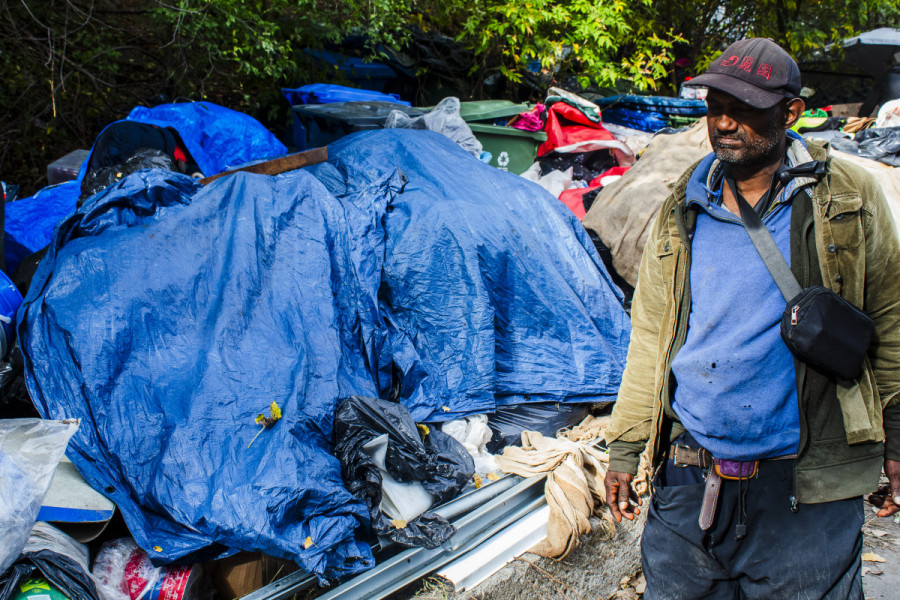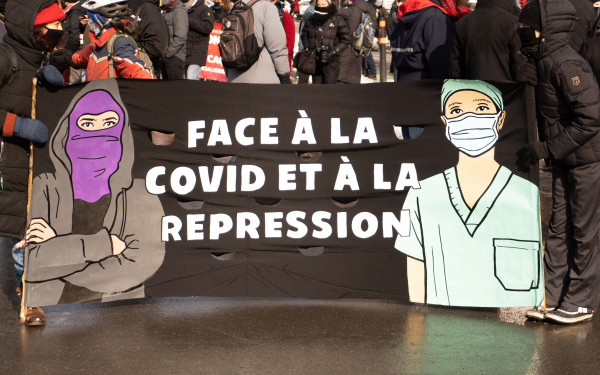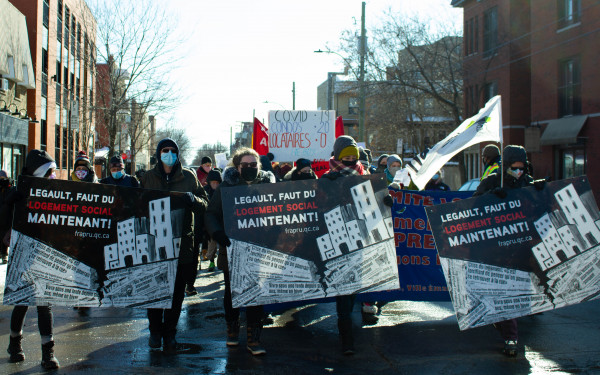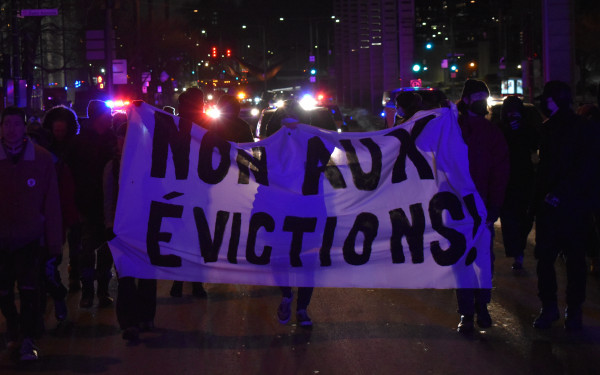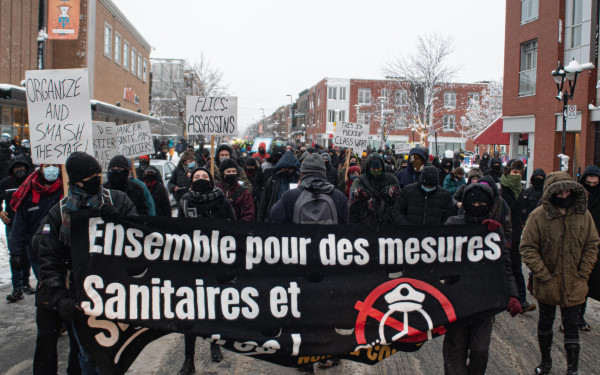No solutions, just evictions
Jacco Stuben, an unhoused man who recently experienced a challenging eviction, faces the threat again
In a small forested area just steps away from a Westmount Sherwin-Williams paint store, tents and trinkets lay low beneath the trees, where Jacco Stuben and one other unhoused individual reside.
The residents were evicted from their previous encampment only two and a half months prior, enduring a hellish cycle of eviction and displacement. After recently being evicted from the encampment under Route 136 of the Ville-Marie Expressway, Stuben can’t seem to escape the shoving hands of the Transports et Mobilité durable Québec (MTQ).
“[MTQ is] throwing people out [...] just rushing everybody out, all the people are [now] scattered on the streets,” Stuben told The Link.
One year ago, MTQ had signed a contract to do repair work on Route 136 of the Ville-Marie expressway; about 20 individuals had lived in the encampment for roughly five years. As preparations for construction began, MTQ realized it would threaten the safety of the individuals living under the expressway if construction proceeded, calling for an evacuation of the area.
MTQ faced criticism from activist groups, allies and shelters for evicting the residents of this encampment without providing adequate alternatives. On account of the campers’ first official eviction date, Montreal’s Autonomous Tenant Union (MATU) organized a public demonstration in retaliation, thus delaying the eviction to a later date.
MTQ’s pattern of proposing an eviction, receiving pushback from the community, and then halting evictions continued until March 2023, when campers were verbally informed by MTQ that the camp was to be vacated along with their belongings by the end of the month. Fifteen days after this notice, Mobile Legal Clinic (MLC), a team that represented the campers’ rights in court, solicited an injunction to prolong the end-of-month eviction against MTQ and arrange for suitable alternatives to the encampment. MLC sought to defer the eviction until mid-July to allow for the relocation of campers in friendly weather while culminating an action plan that redirects these individuals into stable housing, offering social reintegration programs and aiming to permanently detach them from the cycle of homelessness.
This gruelling legal battle ended after the judge ruled construction could no longer be postponed and that the campers would be evicted on July 11, 2023.
MTQ spokesperson Sarah Bensadoun said MTQ had only one purpose throughout all this, “to be able to find long-term housing for the campers.”
In documents acquired by The Link, it is revealed that from the period of Nov. 2022 to July 2023, MTQ spent $38,415 on protection activities—such as fencing and concrete barriers—for the campers and $57,210 on relocation (containers).
Still, only four people who lived under the bridge moved into government-subsidized housing. The others could put their belongings in lockers provided by MTQ and were left to scatter throughout the city.
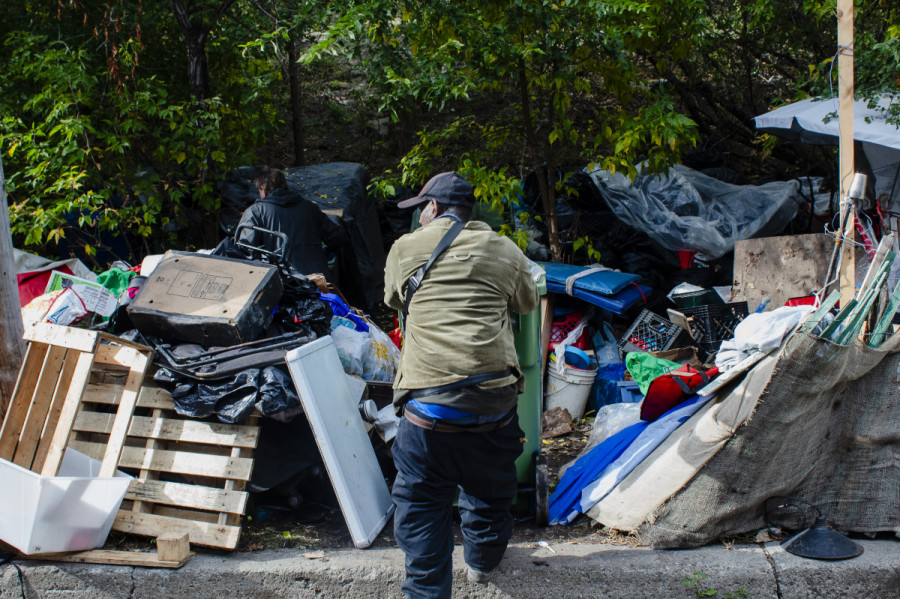
Not only were the campers evicted, but more than half of them currently resorted to more threatening situations than before.
“Everyone is interested in looking good [...] We all wanna look good. Frequently, people choose to look good over facing real problems that are with us,” David Chapman, the executive director of Resilience Montreal, told The Link. “They (MTQ) had people going in for the purposes of saying that they did [help the campers]. That was largely about the optics.”
Two and a half months after the Ville-Marie eviction, Stuben finds himself scrambling as he prepares to be ejected from a different piece of MTQ property in a matter of days.
“Everywhere, the [MTQ] want to conquer,” Stuben said.
Chapman has worked with Montreal’s unhoused population for years and has fought alongside encampment members for their rights since the beginning.
“If simply an alternative location would have been given to the people, there would’ve been no court case. All they needed to do is say where they could go. That proved impossible,” Chapman said, sharing his disappointment about Stuben’s situation.
According to Chapman, dismantling encampments and displacing campers ushers them in search of dark alleyways, small forested spots, and abandoned buildings, which isolates them from the community and forces them into dangerous situations.
“What’s concerning is for some of the folks who’ve headed to abandoned buildings, they won’t even tell me as an intervention worker where they are,” Chapman said. He added that the more secret the location, the lower the probability of eviction. However; “If something goes wrong, you really are in a predicament. There is no one there to administer naloxone. There is no community looking out for you. What it does is it just hastens the probability of an early death.”
On Apr. 11, a judge overseeing the case between MTQ and MLC found that if no alternative solution was granted to the campers in the event of an eviction, the campers would suffer irreparable harm.
“Bonds have been formed between them and as a result of the mutual assistance between them […] they consider themselves a community, which gives them a certain sense of security,” said Judge Chantal Massé in French.
Stuben has been told he is facing eviction due to complaints from neighbours. According to Bensadoun, MTQ must intervene with an encampment when a request by the city, police, or emergency services is made. Guillaume Rivest, press relations for the City of Montreal, told The Link in an email that “the City must intervene very quickly for the safety of all.”
The issue with the dissolution of encampments is the lack of options for those continually displaced.
Rivest declared that, “For the City of Montreal, urban encampments are not a viable, safe or lasting solution.”
Chapman believes rather than shutting down encampments, one could designate an area of a park, or an unused spot under a bridge, “an area where you can be left alone in the meantime,” said Chapman. Without resources to help people transition into subsidized housing and access to affordable housing, Chapman emphasized that encampments will continue to exist.
Shelters aren’t permanently a solution, either. Chapman told The Link, although shelters were liberally offered by MTQ partners to the campers, not one of them went.
Shelters tend to have strict rules, making accommodating individual needs challenging. Out of the 79 shelters listed on Quebec 211 on the island of Montreal, only six allow pets. Some shelters are gendered (which restricts heterosexual couples from living together), only offer daily accommodations or have limited bed availability. Others require interviews and applications by phone or email, and some shelters bear a zero intoxication tolerance, requiring users to do the difficult task of going cold turkey.
Stuben has plenty of belongings that make it difficult to move anywhere: he has an expensive grill he was gifted, which he loves to cook on. On Sept. 28, he was told he had 24 hours to evacuate his new spot. After some negotiation, MTQ asked Stuben to leave by Oct. 9. As of the last contact with Stuben, he is still struggling to collect his belongings and desperately needs a moving truck for transportation. All belongings left behind are thrown in the trash.
Evictions with no solid solution only shake the ground for the unhoused trying to find their footing. “It's not fair. Don't treat us so bad,” Stuben said.
This article originally appeared in Volume 44, Issue 4, published October 17, 2023.

